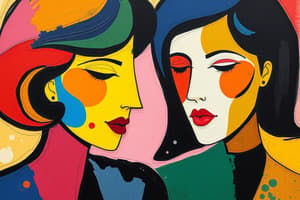Podcast
Questions and Answers
What is the main difference between gender and sex?
What is the main difference between gender and sex?
- Sex refers to biological characteristics, while gender refers to socially constructed roles. (correct)
- Sex is a social construct, while gender is biological.
- Gender refers to biological characteristics, while sex refers to socially constructed roles.
- Gender is determined by race, while sex is determined by class.
What is the primary way that gender roles are learned?
What is the primary way that gender roles are learned?
- Through socialization (correct)
- Through genetic inheritance
- Through media only
- Through education only
What is an example of gender inequality in education?
What is an example of gender inequality in education?
- Men being better at sports than women
- Girls having unequal access to education (correct)
- Boys getting better grades than girls
- Women being better at language arts than men
What is an example of a gender stereotype?
What is an example of a gender stereotype?
What is the concept that recognizes the intersection of multiple social categories?
What is the concept that recognizes the intersection of multiple social categories?
What is the term for the process of learning gender roles and expectations?
What is the term for the process of learning gender roles and expectations?
What is an agent of socialization for gender roles and expectations?
What is an agent of socialization for gender roles and expectations?
What is often linked to gender in society?
What is often linked to gender in society?
Flashcards are hidden until you start studying
Study Notes
Gender and Society
Definition of Gender
- Gender refers to the socially constructed roles, behaviors, and expectations associated with being male or female.
- Gender is different from sex, which refers to biological characteristics.
Gender Roles
- Gender roles are the behaviors, attitudes, and activities that a society expects from men and women.
- Gender roles are often learned through socialization and can vary across cultures and historical periods.
Gender Inequality
- Gender inequality refers to the unequal distribution of power, resources, and opportunities between men and women.
- Gender inequality can manifest in various areas, including:
- Education: unequal access to education, especially for girls and women in some cultures.
- Employment: unequal pay, job opportunities, and career advancement.
- Politics: underrepresentation of women in political offices and decision-making positions.
Gender Stereotypes
- Gender stereotypes are overgeneralized and often inaccurate beliefs about men and women.
- Examples of gender stereotypes:
- Men are aggressive and competitive, while women are nurturing and emotional.
- Men are better at math and science, while women are better at language and arts.
Intersectionality
- Intersectionality recognizes that gender intersects with other social categories, such as:
- Race
- Class
- Sexual orientation
- Disability
- Intersectionality highlights that individuals experience gender differently based on their unique combination of social categories.
Gender and Socialization
- Gender socialization refers to the process of learning gender roles and expectations.
- Agents of socialization include:
- Family
- Education
- Media
- Peers
- Gender socialization can influence an individual's identity, behavior, and opportunities.
Gender and Power
- Gender and power are closely linked, with men often holding more power and privilege in society.
- Patriarchy: a system of social organization in which men hold more power and dominate women.
- Feminism: a movement that seeks to challenge and change this power imbalance.
Gender and Society
Definition of Gender
- Gender refers to socially constructed roles, behaviors, and expectations associated with being male or female.
- Gender is different from sex, which refers to biological characteristics.
Gender Roles
- Gender roles are behaviors, attitudes, and activities expected from men and women by society.
- Gender roles are learned through socialization and can vary across cultures and historical periods.
- Gender roles are often based on stereotypes and can be limiting.
Gender Inequality
- Gender inequality refers to the unequal distribution of power, resources, and opportunities between men and women.
- Examples of gender inequality include:
- Education: unequal access to education, especially for girls and women in some cultures.
- Employment: unequal pay, job opportunities, and career advancement.
- Politics: underrepresentation of women in political offices and decision-making positions.
Gender Stereotypes
- Gender stereotypes are overgeneralized and often inaccurate beliefs about men and women.
- Examples of gender stereotypes include:
- Men are aggressive and competitive, while women are nurturing and emotional.
- Men are better at math and science, while women are better at language and arts.
Intersectionality
- Intersectionality recognizes that gender intersects with other social categories, such as:
- Race
- Class
- Sexual orientation
- Disability
- Intersectionality highlights that individuals experience gender differently based on their unique combination of social categories.
Gender and Socialization
- Gender socialization refers to the process of learning gender roles and expectations.
- Agents of socialization include:
- Family
- Education
- Media
- Peers
- Gender socialization can influence an individual's identity, behavior, and opportunities.
Gender and Power
- Gender and power are closely linked, with men often holding more power and privilege in society.
- Patriarchy: a system of social organization in which men hold more power and dominate women.
- Feminism: a movement that seeks to challenge and change this power imbalance.
- Gender inequality is often reinforced by social and cultural norms.
Studying That Suits You
Use AI to generate personalized quizzes and flashcards to suit your learning preferences.




